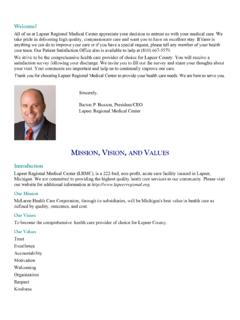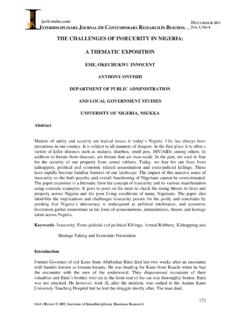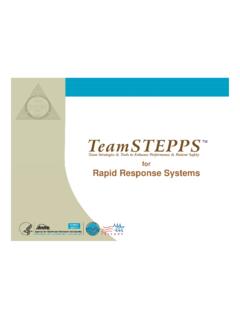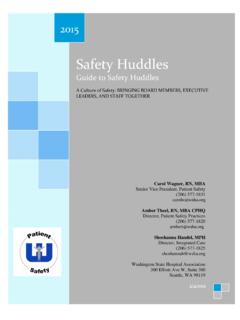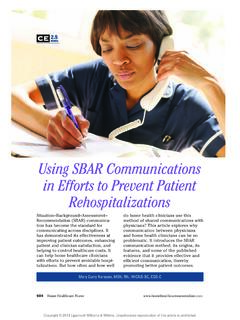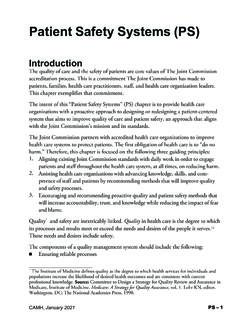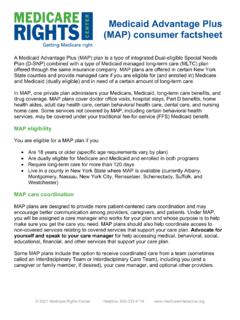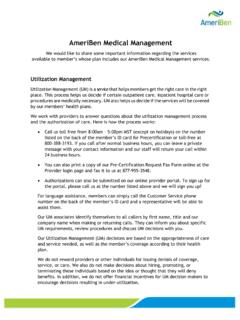Transcription of D-SNP Model of Care Training 2021/2022
1 Providing health coverage to Indiana families since 1994D-SNP Model of Care Training2021/2022 CMS requirements The Centers for Medicare & Medicaid Services (CMS) requires all contracted medical providers and staff receive basic Training about our Dual-Eligible Special Needs Plan ( D-SNP ) Model of Care. The D-SNP Model of Care is a plan for delivering coordinated care and care management to individuals with special needs. This course will describe how MDwise and their contracted providers can work together to successfully deliver a D-SNP Model of Mission MDwise D-SNP program is designed to maximize the quality of care, access to care and health outcomes of our special needs Objectives Define what a Dual Eligible-Special Needs Plan ( D-SNP ) is and what it offers Identify the population that qualifies for this plan Outline MDwise Model of Care Identify requirements to participate in D-SNP Provider Network, guidelines and protocols and network Training opportunities Explain Model of Care Quality Measurement and Performance ImprovementWhat is a D-SNP A D-SNP is a special type of Medicare Advantage plan that provides health benefits for people who are dual eligible, meaning they are entitled to both Medicare and Medicaid.
2 These individuals have complex health care needs. Lack of coordination between the Medicare and Medicaid programs makes it difficult for them to navigate these systems of care and adds to the cost of both programs. D-SNPs were developed to address this group. All D-SNPs are required to have an executed contract with applicable State Medicaid is a D-SNP cont. In a D-SNP , Medicare is always primary; Medicaid is the payer of last resort and supplements Medicare coverage. D-SNPs follow existing Medicare Advantage program rules. Eligible individuals can enroll in a D-SNP during the regular Medicare Advantage enrollment period (October 15 through December 7) or during a Special Enrollment Period. Effective January 2019, eligible individuals are also permitted to make a coverage change one time per quarter during the first nine months of the year with an effective date of enrollment into the new plan being the first of the Qualifies for a D-SNP To be eligible for a D-SNP , an individual must meet the dual eligibility requirements for both Medicare and be eligible/enrolled in Medicare Part A and/or BoReceive full Medicaid benefits and/or assistance with Medicare premiums or cost sharing through a Medicare Savings Program.
3 Qualified individuals must also live in the MDwise Indiana service Qualifies for D-SNP cont. These individuals: Are a more vulnerable subgroup of Medicare beneficiaries Are a mix of over 65 and under 65 who qualified based on a disability Are typically more costly based on health care needs Tend to have a lower income and report lower health status than other beneficiariesWho Qualifies for D-SNPM embers must live in these current MDwise service Cass Fountain Howard Miami Pike Shelby Union Brown Clinton Hamilton Jennings Montgomery Putnam Tipton Warren Carroll Decatur Hendricks Marion Parke Rush Tippecanoe White MDwise Model of Care MDwise's D-SNP Model of Care is a plan for delivering care management and care coordination to:oImprove qualityoIncrease accessoCreate affordabilityoIntegrate and coordinate care across specialtiesoProvide seamless transitions of careoImprove use of preventive health servicesoEncourage appropriate utilization and cost effectivenessoImprove member healthMDwise Model of Care cont.
4 MDwise's D-SNP Model of Care design includes the following:oCompletion of an annual Health Risk Assessment (HRA)oDevelopment and coordination of an interdisciplinary Care Team (ICT) oDevelopment of an Individualized Care Plan (ICP)oAnnual health exam with Primary Care Provider (PCP)oCare coordinationoD-SNP benefitsoProvider participationoProvider network guidelines and protocolsoQuality Measurement and Performance ImprovementMDwise HRA The HRA:oHelps identify members with the most urgent needsoIs an important part of a member s care coordinationoContains member self-reported informationoHelps create the member s individualized care planoAssesses the following needs of each member: Medical Functional Cognitive Psychosocial Mental HealthHRA process13 Attempt to reach memberCare Manager conducts HRAT hree attemptsCompleted within 90 days of member enrollment into DSNPI ncludes a comprehensive assessment of member needs, including medical, behavioral, cognitive, functional and social needsUnable to Reach, Letter is issued (includes Care Coordinator contact information)If member or legal representative refuses care coordination, this is documented in the member s recordMust be completed annually within one year of the Initial Assessment or previous HRAI nterdisciplinary Care Team (ICT)
5 14 Member and Care ManagerPrimary Care ProviderSpecialistsFamily/CaregiverSocia l ServicesPharmacistsVendorsHome Health Each member is managed by a care team Care team participants are based on the member s needs Care Managers will keep the team updated with information involving the member s care plan Team meets formally Smaller meetings occur, as neededICT participation Determine each member s goals and needs Coordinate member care Identify problems and anticipate member crisis Educate members about conditions and medications Coach members to use their ICP Refer members to community resources Manage transitionsoIdentify problems that could cause transitionsoTry to prevent unplanned transitions Coordinate Medicare and Medicaid benefits for members Identify and assist members with changes in the Medicaid eligibility15 ICT process Each member will have an ICT meeting at least annually and when there is a change in condition, as required Care Manager coordinates the ICT Care Manager meets with the member, caregivers, PCP and other member supports ( , Behavioral Health, Home Care Nurses, DME)
6 Internal monthly ICT rounds occur for care coordination as indicated per the member s plan of care16 Individualized care plan (ICP) The ICP is the mechanism for evaluating a member s current health status. It is the ongoing action plan to address a member s care needs in conjunction with the ICT and member. These plans contain member-specific problems, goals and interventions, addressing issues found during the HRA and any team interactions. This is a living document that changes as the member ICP is developed and maintained for each D-SNP member using:HRA resultsLaboratory results, pharmacy, emergency department and hospital claims data Care Manager interactionICT inputMember preferences and goalsAnnual health exam with PCPI ndividualized care plan (ICP)The Member Profile section of the ICP: Summarizes the ICP Captures HEDIS gaps in care Contains medication review notes from MDwise pharmacists Includes diagnoses from claims data, certain lab results and a list of current medications filled by memberICP Tiers19 High riskMost vulnerable members.
7 Includes those with high utilization and multiple unmanaged chronicconditionsMedium riskMembers generally have multiple chronic conditions, some of which may not be riskContains the most stable D-SNP the information obtained from the HRA, ICT, and annual health exam, D-SNP members are tiered and placed into various clinical programs to improve their health and transitions of Process20 Care Manager completes the ICP within 14 days of the HRA ICP must include interventions specifically designed to meet the needs identified in the HRA ICP must have 3-5 long-and short-term goals and include measurable outcomes ICP must address any barriers to care, plus any education, social/community and cultural/language needs ICP must have input from the member or legal representative; must obtain a copy of a member-signed ICP Care Manager must send the ICP to the PCP s office to add to the member s record If member refuses care coordination, it s documented in the medical record If member refuses care coordination, member is kept at low risk status and an ICP is created ICP is issued to the ICT, member and providers via mail, fax or secure emailAnnual Health Exam with Primary Care Provider (PCP) Goal is to have preventive and annual exams performed within six months of enrollment Results from the exam contribute to the ICP The PCP monitors and schedules appropriate screenings Care Manager can help schedule visits The PCP monitors all chronic conditions and schedules any appropriate tests and/or screenings, referrals and medications Member HRA and ICP is always available to the PCP through our secure member/provider portal.
8 Structure for MDwise Operations Staff structureoAdministrative staff: Customer service, Appeals and Grievances, claims, enrollmentoClinical staff: Care managers, social workers, nurses, behavioral health/substance abuse cliniciansoOversight staff: Quality improvement, credentialing, provider services, Medical Director22 Care coordination Integrate and coordinate care across specialtiesoMDwise integrates and coordinates care for D-SNP members across the care continuum through a central point of contact. The Care Manager functions as this central contact across all settings and providers. To improve coordination of care:oPCP is the gatekeeper and is responsible for identifying the needs of the beneficiaryoCare Manager coordinates care with the member, the member s PCP and other participants of the member s ICToAll D-SNP members have a PCP and Care Manager23 Care coordination For seamless transitions between care settings :oNotify the member s PCP of a transitionoShare the member s ICP with the PCP, the hospitalist, the facility, and/or the member/caregiver oContact the member prior to a planned transition to provide educational materials and answer questions related to the upcoming transition24 Care coordination Post-hospitalization transition of care.
9 OIncludes phone calls after being discharged home from the hospital (3-day post- hospital call /14-day follow-up call ) Helps member understand discharge diagnosis and instructions Facilitates follow-up appointments Helps schedule transportation Assists with needed home health care and medical equipment Resolves barriers to obtaining medications Educates member on new or continuing medical conditions25D-SNP benefits A D-SNP includes coverage for hospital services (Medicare Part A), medical health care needs (Medicare Part B) and prescription drugs (Medicare Part D). The plan goes beyond either Medicaid or Original Medicare alone with extra benefits and features at no extra cost. Additional benefits may include:26No or low cost sharingCare coordinationVision and hearing benefitsOver-the-counter quarterly allowanceTransportation benefitsTelehealth servicesGym membershipsMedication therapy managementDiet and nutritional educationBehavioral health servicesEnd-of-life support servicesSocial work supportHome and community-based services partnershipsMeal programsProvider participation Provider partners are an invaluable part of the ICP.
10 Our D-SNP Model of Care offers an opportunity for us to work together for the benefit of our member, your patient, by:oEnhancing communicationoFocusing on each member s special needsoDelivering care management programs to assist with the patient s medical and non-medical needsoSupporting the member s plan of care27 Provider participation You can help by:oCommunicating with D-SNP Care Managers, ICT members, members and caregiversoCollaborating with MDwise on ICPsoReviewing and responding to patient-specific communicationoMaintaining ICPs in member medical recordsoParticipating in ICTsoReminding members of the importance of the HRA, which is essential in the development of the ICPoEncouraging members to work with their ICToCompleting the Model of Care Training upon onboarding and again annually28 Provider participation The D-SNP network must meet the needs of the dual-eligible population served.
